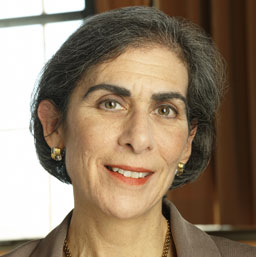
It’s official: Amy Wax’s lawsuit against the University of Pennsylvania just got laughed out of court. The Penn Law professor had sued the school after it imposed altogether minor sanctions on her following a finding of “flagrant unprofessional conduct.” That outcome followed literally years of unprofessional behavior: from baselessly insulting Black graduates to inviting white nationalists to campus. Rather than accept the penalty — which did not take away her tenure or job — Wax filed a lawsuit claiming the school was discriminating against her as a White Jewish woman and something something First Amendment.
Shockingly, that did not work.

Transform Legal Reasoning Into Business-Ready Results With General AI
Protégé™ General AI is fundamentally changing how legal professionals use AI in their everyday practice.
Judge Timothy Savage of the Eastern District of Pennsylvania did not take long to give Wax’s masterwork of self-pity the Icarus treatment:
As much as Wax would like otherwise, this case is not a First Amendment case. It is a discrimination case brought under federal antidiscrimination laws. It calls for us to determine whether offensive comments directed at racial minorities are protected by those laws.
Having considered Penn’s motion to dismiss the Amended Complaint for failure to state a cause of action, we conclude Wax has failed to allege facts that show that her race was a factor in the disciplinary process and there is no cause of action under federal antidiscrimination statutes based on the content of her speech. Thus, we will dismiss the federal discrimination claims and decline to exercise supplemental jurisdiction over her state law claims.
When Wax first filed her complaint, we pointed out that the First Amendment doesn’t get people out of hostile work environment allegations. For his part, Judge Savage already tried to impress upon Wax that the First Amendment claims weren’t going to fly when she tried to have her sanctions enjoined. So today’s opinion shouldn’t come as a surprise to any but the most delusional observer.
For those keeping score at home, Wax claimed that, after repeated — and increasingly audacious — statements about race including explaining that the country really needed fewer Asians, the sanctions Penn levied were actually racial discrimination against her.

5 Tips For Proving Your Legal Department’s Value
Join our expert panel on March 3rd at 1pm ET to explore actionable, emerging ways you can gather and proactively share the data that demonstrates the impact of your work.
She had two theories. First, she argued that she was being discriminated against because the content of her speech dealt with race. That’s the part where she was trying to shoehorn the First Amendment into a discrimination case and Judge Savage was appropriately savage in pointing out that discrimination laws cover the race of speakers and not the speech. Attempting to get around this obstacle, Wax proffered a wacky theory was that the school doesn’t punish critics of Israel the way she’s being punished for saying Black students can’t get good grades at Penn and therefore the school is discriminating her for being Jewish. She cobbled together a few instances of speakers at Penn who criticized Israel’s conduct in Gaza and didn’t get punished the way she did. The judge wasn’t impressed.
As is apparent from Wax’s allegations and what she did not allege, the purported comparators are not comparators. She did not allege any of them made more than two harmful statements. See Wilcher, 441 F. Appx at 882. She did not allege they made statements about the law school or even the wider University community. All of the comments in her complaint had to do with current events. None of the alleged comparators had a pattern of making denigrating and derogatory statements about minorities. Wax also does not identify the race of the alleged comparators, except Almallah, a Palestinian who participated in a rally in support of Palestine. They do not compare to Wax, a tenured law professor with a record of derogatory and discriminatory statements to and about members of the university community, who was given warnings and on whom lesser disciplinary measures were imposed before she was subjected to disciplinary proceedings.
This is the Wax playbook in miniature: mistake academic tenure for a Willy Wonka-style golden ticket to rant about white grievance fantasies, then shriek “censorship!” when the school says the First Amendment doesn’t let her make students feel like their professor is discriminating against them on the basis of race. She keeps trying to rerun this routine in different courts and committees, as if eventually someone will squint hard enough at the statutes and say, “You know what, Amy, you’re right — racial harassers are a protected class.”
Without a federal discrimination claim, her state contract claims couldn’t keep her in federal court.
In sum, her allegations, accepted as true, do not pass the plausibility test. Conclusory statements are not substitutes for facts. Subjective beliefs are not facts.
He’s talking about the complaint, but this unintentionally sums up the whole Amy Wax “academic freedom” lament. Conclusory statements and subjective beliefs are not facts. And to the extent academic freedom exists to shield academics in the pursuit of truth, it’s not an excuse to lazily hammer out your Fox News talking head application and pretend it’s scholarship.
As a final twist, Judge Savage clarifies that no amendment could possibly salvage this turd, denying leave for Wax to file a potential amended complaint.
Thus ends — for now — this academic dumpster fire. But Wax still has her job, so the next professional inquiry is surely around the corner.
(Check out the opinion on the next page…)
 Joe Patrice is a senior editor at Above the Law and co-host of Thinking Like A Lawyer. Feel free to email any tips, questions, or comments. Follow him on Twitter or Bluesky if you’re interested in law, politics, and a healthy dose of college sports news. Joe also serves as a Managing Director at RPN Executive Search.
Joe Patrice is a senior editor at Above the Law and co-host of Thinking Like A Lawyer. Feel free to email any tips, questions, or comments. Follow him on Twitter or Bluesky if you’re interested in law, politics, and a healthy dose of college sports news. Joe also serves as a Managing Director at RPN Executive Search.